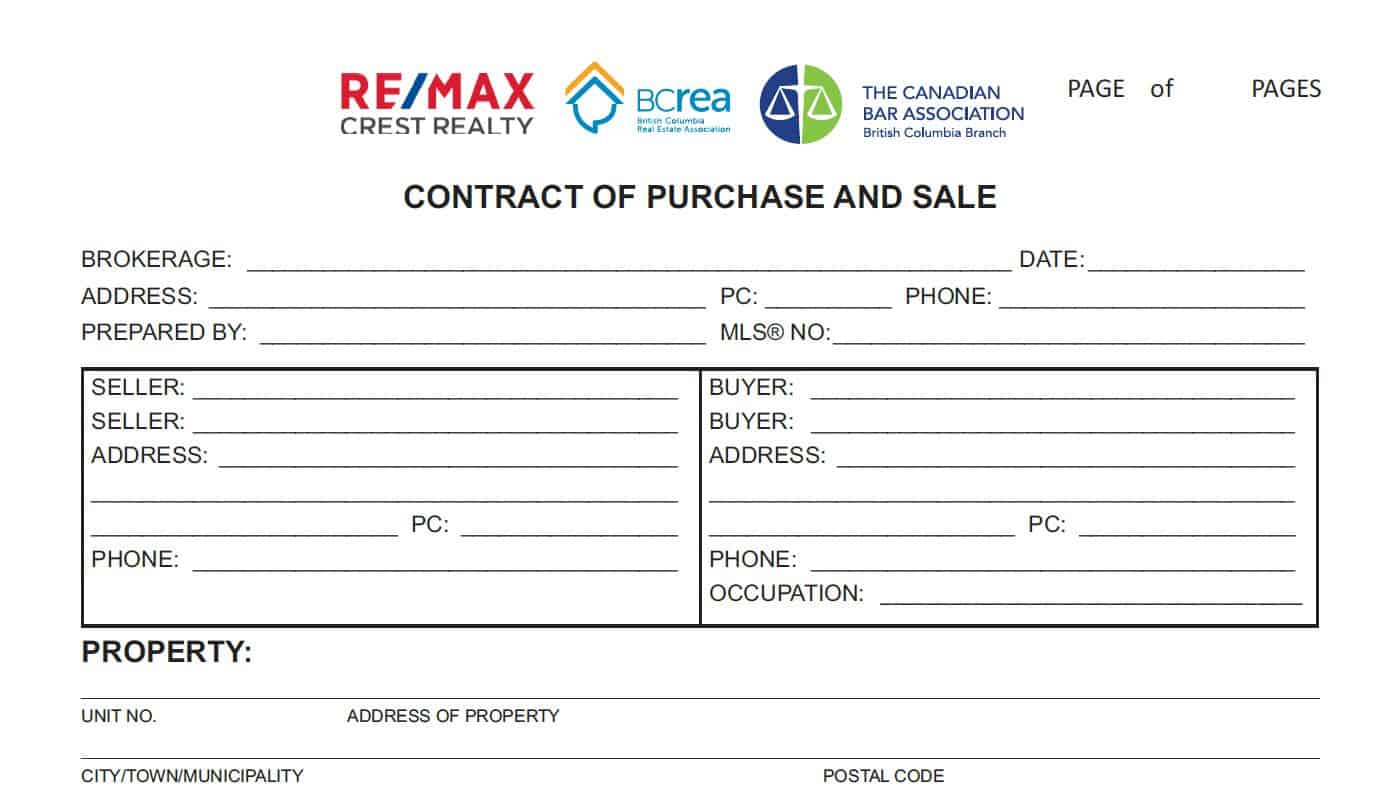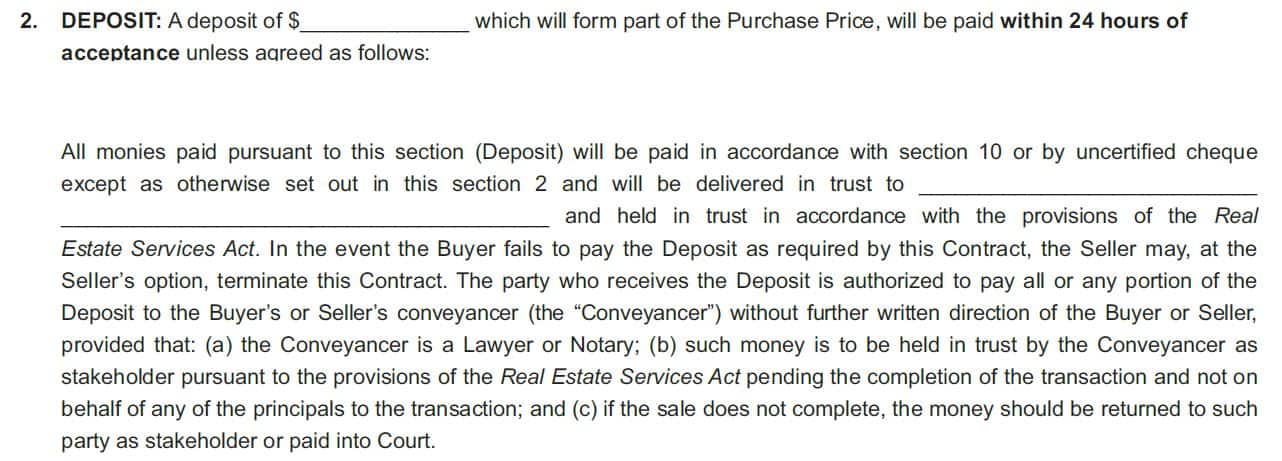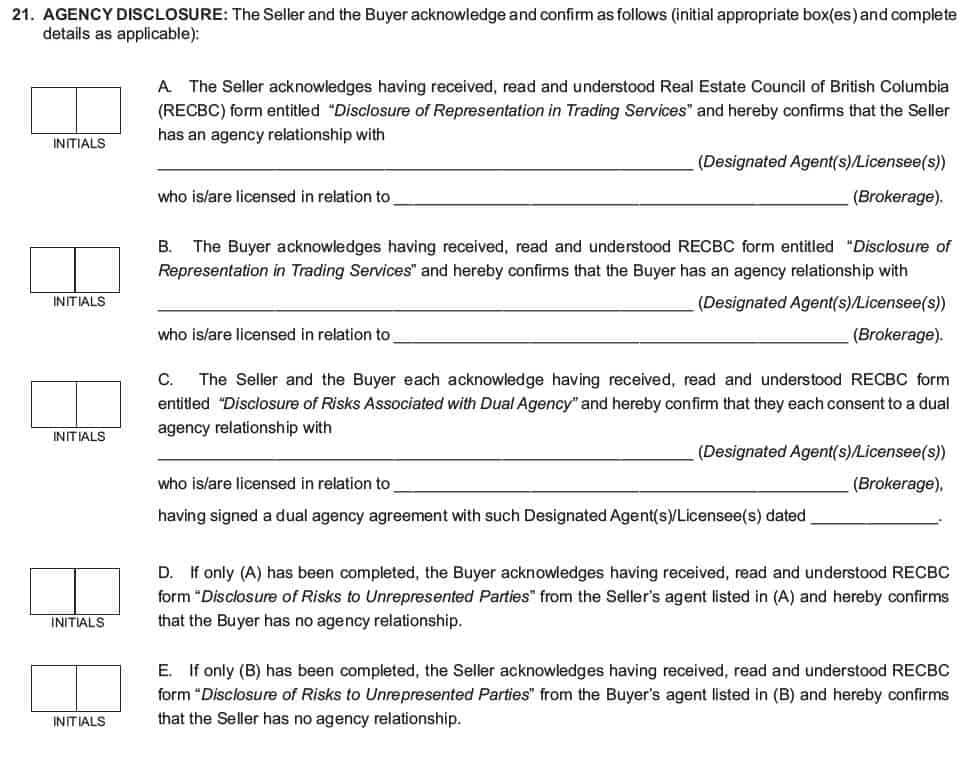

Vancouver first time home buyers often have questions about Contracts of Purchase and Sale in BC. Not knowing how the Contract of Purchase and Sale work in British Columbia can be a massive problem because making a mistake, when buying a home, can cost tens of thousands of dollars. Therefore, in this blog, I will talk about the most critical sections, and clauses buyers should be aware of when signing the BC Contract of Purchase and Sale form.
I will start by first explaining the buying process briefly. See below a short procedure on purchasing a real estate in BC.
1. Buyer drafts agreement of purchase and sale (offer).
2. Seller reviews the purchase and sale agreement.
3. The seller counters the purchase agreement.
4. The buyer reviews the purchase agreement.
5.1 Seller accepts the offer. If the seller approves the offer, the buyer will remove the conditions on the offer in the next 7-14 days, depending on how long the subject removal date is. At the end of the subject removal date, the buyer removes conditions, and the sale becomes firm.
5.2 Seller rejects the offer. If the seller rejects the offer, the buyer can counter-offer again. Between the buyer and the seller, the offer and counter-offer process can go back and forth several times. Sometimes, after several rounds of negotiation, if the buyer and the seller still cannot agree on the price and other terms of the condition, both the buyer and seller may decide to walk away from the negotiation.
Please note that this blog is for information only. Buyers are advised to obtain independent legal advice before buying a real estate property.
Table of Contents
The Contract of Purchase and Sale (CPS) is one of the standard BC Real Estate forms, developed by the British Columbia Real Estate Association, and used throughout BC and the Lower Mainland. There are different names for the CPS, e.g. “Agreement of Purchase and Sale,” “Purchase Agreement, or “Offer.” It is merely a standard contract developed and field-tested by realtors with expert input from real estate lawyers.
The contract is a legal document and has evolved over time and will continue to do so. Significant changes are made to the form from time to time due to changes in practice, new legislation or the outcome of legal cases. When you are looking to buy a home in Vancouver or Richmond, BC, be sure to use the most recent version of the form. Always check the date on the bottom left of the page to confirm it is the most current version.
The CPS is not to be confused with the BC Assignment of Contract of Purchase and Sale Agreement. The Assignment of Contract is used when a buyer transfers the purchase contract to another buyer before the completion date.
The standard BC Contract of Purchase and Sale has six pages that have 25 essential sections. There is also an information sheet attached to the contract. This blog will cover the nine most critical parts of the agreement.
The “INFORMATION ABOUT THIS CONTRACT” page was designed to be a separate, stand-alone document that clarifies many sections of the contract. Buyers and sellers must read this page. When working with a buyer, I will have the buyer sign his or her initials after we go over the information page.

Section one is where the buyer puts in the offer price. What is the right offer price? It depends on several factors. When I work with a home buyer to write an offer for a property, I often look at the current housing market, real estate sales in the neighbourhood, and the unit’s current condition to determine the appropriate purchase price.

Section two is where the buyer puts in the deposit amount he/she wishes to put down to secure the property after removing all the subject conditions on the Contract of Purchase and Sale.
The deposit is usually 5% of the agreed purchase price. However, this amount may vary depending on many factors.
When the Vancouver Housing Market was very hot in 2018, where multiple offers were the norm, sometimes I recommend the buyer to increase the deposit amount to 10% of the purchase price. By increasing the deposit amount, the offer will look more favourable to the seller against other offers that have the same offer price. Thus, increasing the likelihood of the seller accepting the buyer’s offer.

Section three is the section where the homebuyer puts in the subject conditions of their offer. Realtors often call these conditions “subjects.” For example, if the buyer needs financing, he/she would put a clause in the terms and conditions section, “ Subject to a new first mortgage being made available to the buyer by June 1, 2020. This condition is for the sole benefit of the buyer . “
Besides finance subjects, I often recommend that my buyer put other subjects, including home inspection, review Property Disclosure Statement, Title, and Strata Documents.
Many times, additional terms and conditions are essential to the contract. These other terms and conditions must be adequately appended to the contract by the Contract of Purchase and Sale Addendum.

Section four is about the completion date. The completion date is when the property must be registered at the Land Title Office, and the seller receives payment.
The completion date should occur one or two days before the possession date to allow the seller to receive the funds before the possession date.

Section five talks about the day Buyer takes possession of the property. Possession date is the day the buyer is entitled to take legal ownership of the property. They may be physically moving in, or it may be a rental property, and they are taking over as the landlord.
The buyer needs to fill out the Date and the Time in the Possession Section. For example, the buyer will have vacant possession of the property at 11:59 A.M. on July 16, 2020.
The possession date is often not on the same day as the completion date because this allows the seller to receive their funds before handing over the property.
In the event the property is rented in whole or in part, information regarding the tenancy will be included in this section, e.g., John Smith in Basement.
If the subject property has a tenant, the details of the tenancy must be identified. The BC Residential Tenancy Agreement should be attached as an addendum. Since 1996, the Residential Tenancy Act has required residential tenancies to be in writing.

The adjustment date is the date that Lawyers and Notary Public use to adjust Property Tax and Strata Fee. Typically the seller will pay the property tax and strata fee before the adjustment date, and the homebuyer will pay the property tax and strata fee after the adjustment date. Typically the adjustment date is the same as the possession date. Sometimes the adjustment date can be on the same day as the completion date.

The “Included Items” on the Contract of Purchase and Sale means the items included in the contract of the purchase. Things that are usually written in the included items are Fridge, Stove, Dishwasher, Oven, Washer and Dryer. Sometimes, the buyer will also want to include beautiful chandeliers in the purchase as well.

Section twenty-one outlines the agency relationship. The buyer and the Realtor confirms the agency relationship that they have.
The Agency disclosure section outlines the various type of agency relationships. The buyer will need to initial section 21. B to acknowledge the realtor/agent that he/she is working with.

Section twenty-four talks about when the “offer” or “purchase agreement” will expire. Often the buyer gives the seller between 24 to 48 hours to consider an offer. In a highly competitive market, it is recommended to provide the seller with less time to think. I have helped a buyer write an offer where we only give the seller 12 hours to consider our offer.
Sometimes the seller might be overseas and not easily reachable. In this case, we might need to give the seller more time to consider the offer and probably have the offer expire in 48 hours or more.

BC Contract of Purchase is a legal document that plays an important role when a buyer is looking to purchase a condo or real estate in BC. Above mentioned is a simplified overview of the purchase contract to buy a home in Vancouver and other cities in BC. There are many more details on the contract that buyers and sellers need to be aware of in a real estate transaction.
If you have any other questions about the Contract of Purchase and Sale in BC, please contact me or give me a call at 778-991-0649.